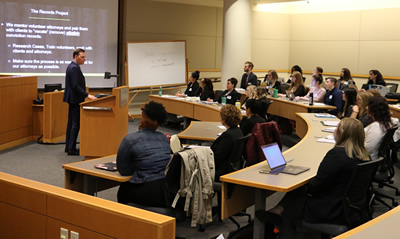"My heart is so full right now."
 That's how first-year law student Crystal Nelson reacted after working with a client at Seattle University School of Law's first-ever free legal clinic to vacate criminal records, held in conjunction with the King County Bar Association (KCBA).
That's how first-year law student Crystal Nelson reacted after working with a client at Seattle University School of Law's first-ever free legal clinic to vacate criminal records, held in conjunction with the King County Bar Association (KCBA).
Nelson helped one of the first clients who walked in the doors. Although she couldn't discuss the details of her client's case, Nelson knows what it's like to walk in her shoes. Two misdemeanors on her own record continue to follow her.
"They're from 18 years ago. I didn't think in the slightest that they would still affect my life," she said. "But they do. It's important for people in the legal world to know what that's like."
Nissia M., a community college student who came to the clinic as a client, was thrilled to find out that her 10-year-old misdemeanor conviction for shoplifting was eligible to be cleared.
"I'm planning to open my own small business, and I want to apply for a master's in social work," she said. "I was living on the streets. I was desperate. But I got myself together and I don't want that old conviction to get in the way of my future."
Second-year law student Torri Pittman, the public interest representative to the Student Bar Association, spearheaded the event along with the law school's Access to Justice Institute and other student groups to showcase the value of public interest law.
"Having a criminal record vacated makes an astronomical difference in someone's life," she said. "How can we expect people to come out of incarceration and be productive members of society when at every turn that conviction holds them back?"
Pittman said the event was so popular that she had filled all available volunteer slots within an hour and a half of sending out the request to her classmates.
Criminal convictions, even old ones, can often block people from housing, employment, and professional licenses. In Nelson's case, her past mistakes nearly cost her an internship, even though she was a Dean's List student at University of Washington Bothell at the time. Thankfully, a colleague advocated on her behalf.
Nelson and dozens of other criminal justice reform activists, including Tarra Simmons '17, lobbied state legislators in Olympia to pass the New Hope Act, which went into effect this summer. The new law makes it easier for people with certain misdemeanor or felony convictions to clear their records, as long as the convictions meet certain criteria, the person has paid their legal debts, and enough time has passed (three, five, or 10 years, depending on the offense).
Jacob Kuykendall '13 and Maria Jouravleva '17, staff attorneys at the KCBA Records Project, provided training for the 35 students who volunteered for the clinic. Working in teams of three — one first-year student, one second-year, and one volunteer attorney — the volunteers staffed five classrooms in the law school for three shifts, helping a total of 15 clients.
Kuykendall said that's as many people as the Records Project typically serves in one month.
The process to vacate criminal records entails determining whether clients' convictions are eligible to be cleared, filling out the necessary forms, obtaining copies of original judgments and sentences, and sending all relevant paperwork to appropriate courts for approval.
Many clients who attended the clinic were able to complete all the necessary paperwork, with court approval as the only remaining step in the process.
"It was inspiring to see Seattle U Law students come together to make a meaningful impact in people's lives," Jouravleva said.
